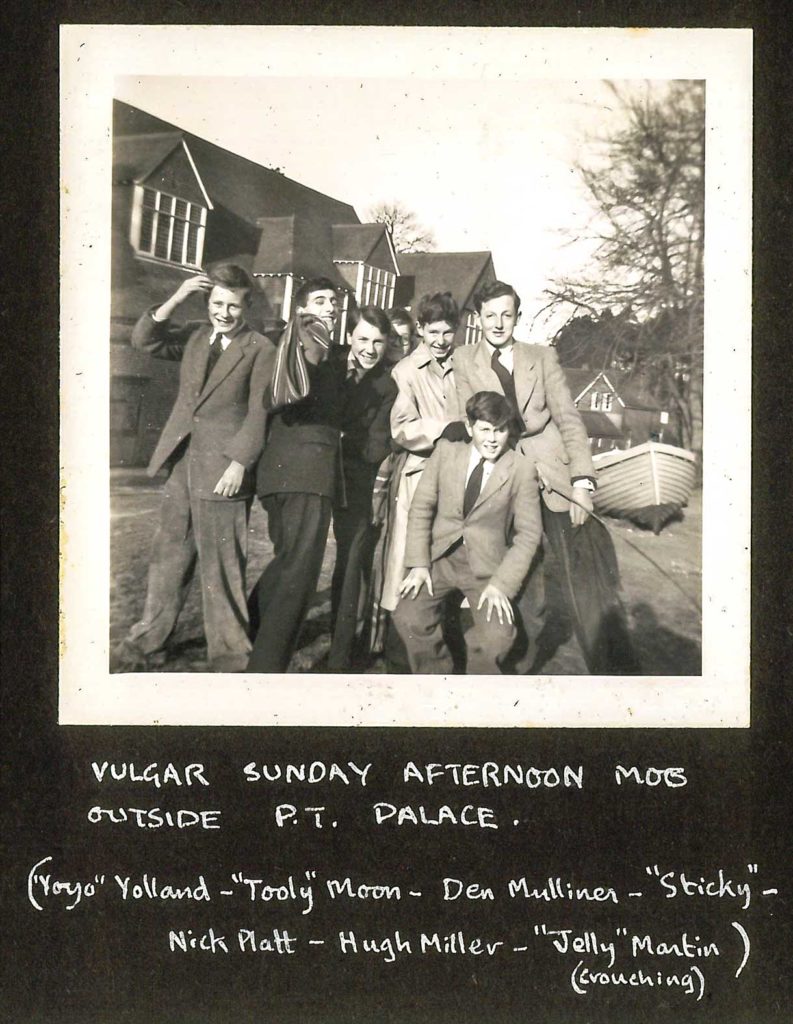Spare time
Spare time was something of a rare commodity for 1950s Wellingtonians, but despite limited opportunities, our respondents described a variety of ways in which they entertained themselves.
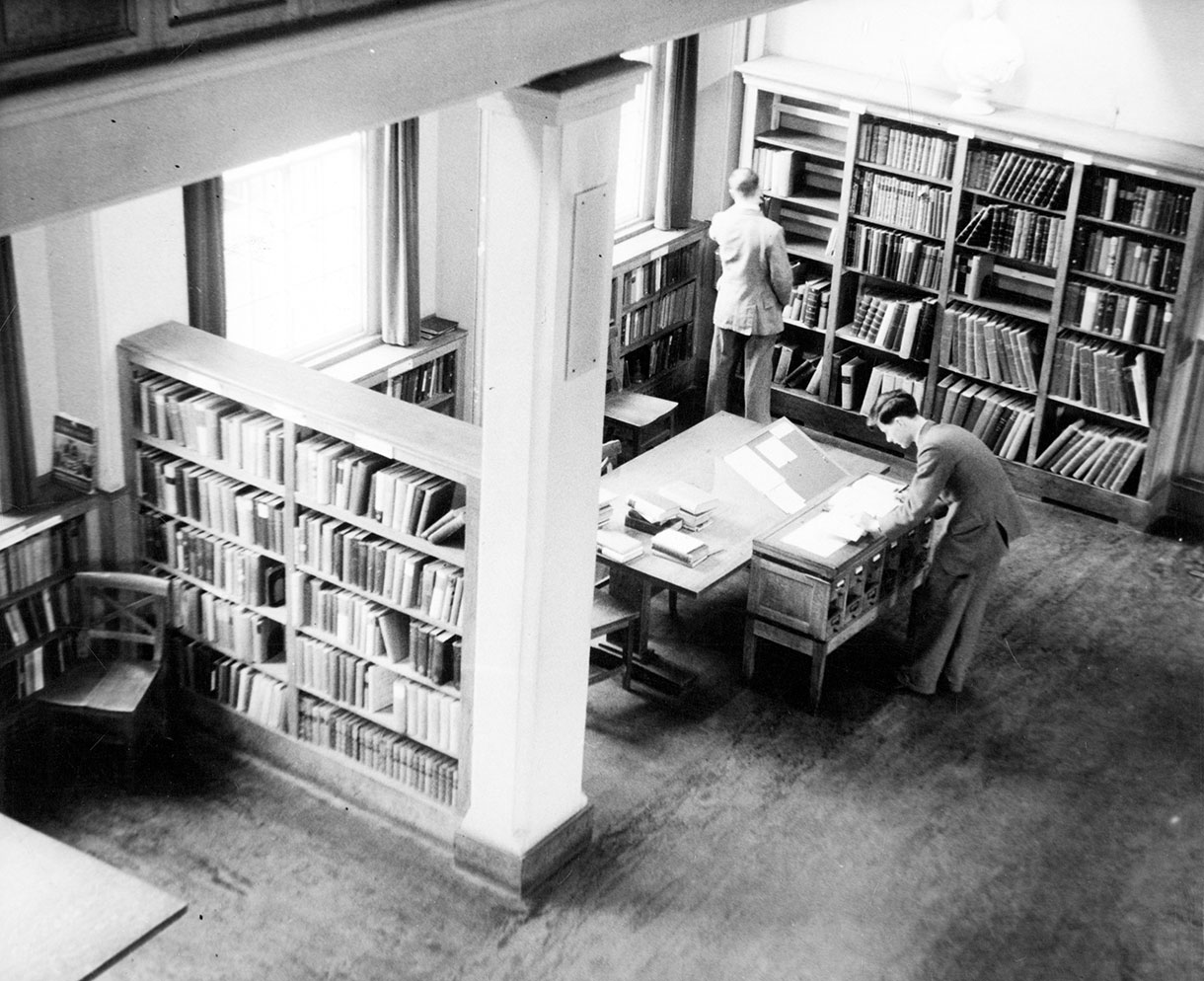
How much spare time?
Many OWs felt that they had not had much spare time at Wellington, explaining that most time outside the classroom was taken up by sport, runs, choir practice, prep, land-work and so on.
John Le Mare (Stanley 1950-55) commented that ‘I think our daily life was intentionally organized so we did not have too much free time,’ and Richard May-Hill (Hopetoun 1957-61) considered ‘Each day was undoubtedly organised to make this a scarce commodity, except at weekends. As Saturday games were compulsory, only Sunday provided available free time. Even this was regulated.’
Several others enlarged on this latter point. Christopher Beeton (Talbot 1943-47) wrote that ‘On Sunday afternoons, we had to be out of the House for a couple of hours, unless it was raining really hard,’ and John Hoblyn (Hardinge 1945-50) agreed: ‘On Saturday, and Sunday afternoons we had to be out of the College buildings and took lots of walks and long bicycle rides.’
Nikolai Tolstoy-Miloslavsky (Stanley 1949-53) summed it up best:
‘There was very little spare time during the week, but after Saturday lunchtime there was almost too much of it. Crowthorne was a dull little hamlet, and we were forbidden to visit any town within a certain radius of the College. At the time I was frequently bored, particularly on Sunday.’
Alan Munro (Talbot 1948-53) agreed: ‘Shopping centres were the WH Smith bookshop and the Post Office in Lower Crowthorne, and the occasional walk up to Upper Crow for supplies, but there was little to attract in what was an out-of-the-way village on the verge of Windsor Forest. Local pubs, like the Waterloo opposite the Talbot, were firmly closed to us. It was an age when we were thrown on our own resources for entertainment.’
Overall, many felt that this balanced out to give ‘adequate’ free time, or as Thomas Collett-White (Picton 1950-55) put it, ‘spare time in spasms.’ George Nicholson (Hardinge 1949-54) considered that there had been ‘too much spare time,’, while an anonymous OW enlarged ‘rather too much spare time, I think, or more specifically not enough guidance on how to use it.’ Nick Harding (Combermere 1951-1955) remembered being ‘very bored a lot of the time.’
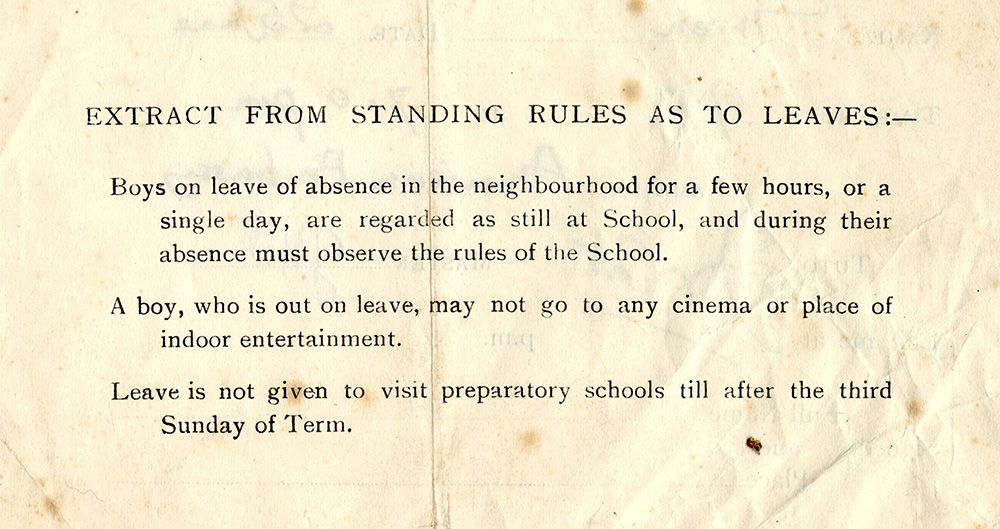
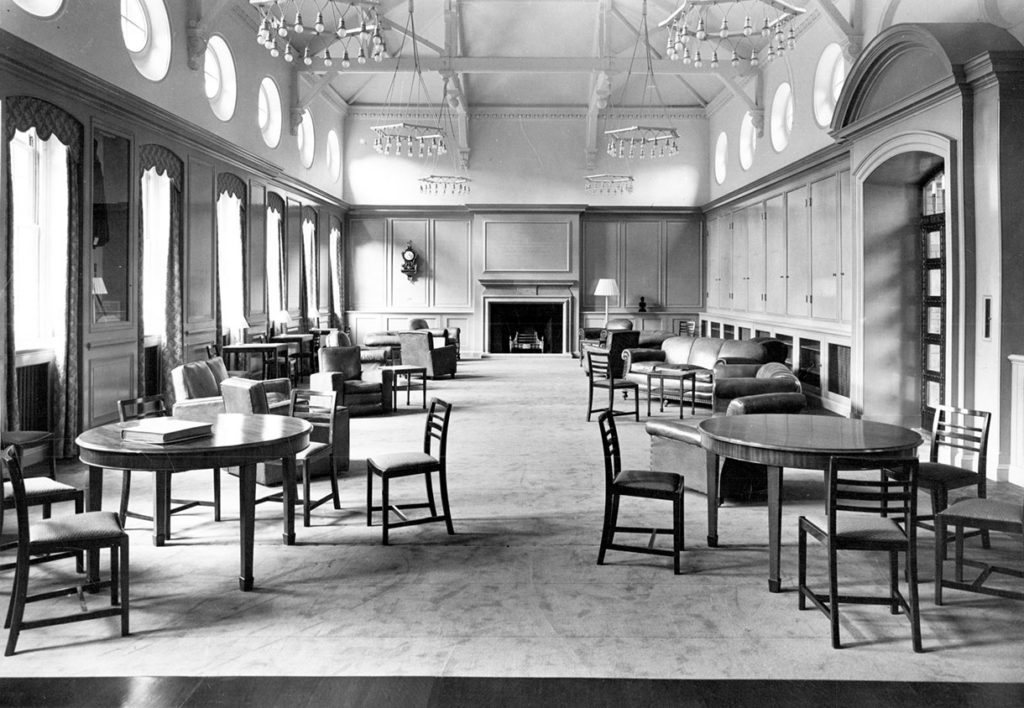
Simple pastimes
At some stage, all Wellingtonians indulged in simple pastimes, such as reading:
‘If I wasn’t doing schoolwork, then I read – I was a voracious reader – I used to go down to the WH Smith’s shop near the railway station, and during my time in college I bought several of P G Wodehouse’s novels – I still have them: Jill the Reckless and Eggs, Beans and Crumpets, to name but two. They cost five shillings for a hardback (other than Penguins, there were no paperbacks then: they started to come in generally in about 1952-3). And I used the College Library on South Front… What I did there was to work my way through the complete run of bound volumes of Punch, from 1841 to 1948; and also the Illustrated London News and the Graphic – so I learned quite a lot of Victorian social and imperial history, and the same for the first half of the 20th century.’ Alastair Wilson (Talbot 1948-1950)
Peter Davison (Beresford 1948-52) also considered the Library ‘a place of refuge,’ and Nikolai Tolstoy-Miloslavsky (Stanley 1949-53) wrote ‘I spent unforgettable hours in the fine Library, and can list a score or more books from its shelves which made a lasting impression on me. I also spent many a Sunday afternoon in bad weather browsing through the huge set of leather-bound copies of the Illustrated London News housed in Great School.’
‘I very much enjoyed going to Great School, which was centrally heated in Winter, and reading the magnificent leather-bound copies of Illustrated London News.’ Nigel Hamley (Hill 1952-55)
‘I read novels, not of the first rank. I don’t remember the opening of Great School, but once it was opened, I regularly went there to read the newspapers.’ Charles Wade (Lynedoch 1947-50)
‘I read almost anything, as long as it was not connected to schoolwork.’
Martin Kinna (Murray 1953-58)
Other indoor hobbies included making model boats or planes, or stamp-collecting, and Dick Barton (Lynedoch 1938-42) recalled an ‘odd phase of knitting.’ However, many preferred to spend their free time outdoors. Tim Shoosmith (Blücher 1953-57) considered that ‘the best time!’ was ‘walking, chatting to my close friends,’ and many others mentioned walking within the College grounds, or further afield:
‘On Saturday evenings in the winter months, I sometimes went for a walk with a friend outside College; this was not allowed and we were lucky not to have been caught.’ Charles Wade (Lynedoch 1947-50)
Older boys and those with special responsibilities were allowed bicycles, which opened up the possibility of longer journeys:
‘When in the General Sixth (successor to the old Army Sixth – referred to by some as the “Bicycle Sixth” as Sixth Formers had the same bicycle privileges as Dormitory Prefects), I used to spend quite a lot of time cycling round Berkshire or visiting Camberley – with one’s Tutor’s permission of course – sometimes with a friend, sometimes on my own.’ Charles Ward (Hopetoun 1951-55)
‘Marston [Tutor] also allowed me to keep a bike as I was not C of E and attended Sunday School in Camberley, which gave me some sense of freedom at weekends. I chafed a bit at Wellington’s confining rules of not being allowed off the College grounds and longed to escape them. I was reading a lot about WW2 at the time and imagined being in a POW camp.’ Graeme Shelford (Hardinge 1954-57)
A lucky few had parents or other relatives who lived close enough to be visited by bicycle at weekends, which provided a welcome change from the atmosphere of College.
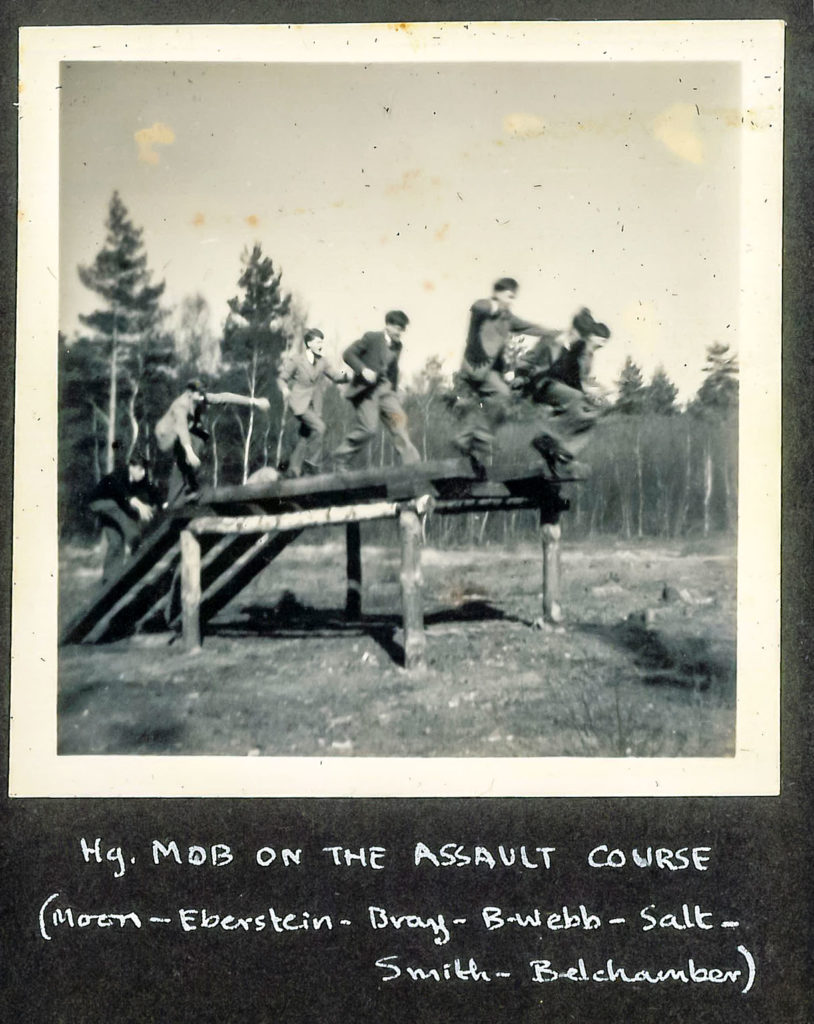
Fishing, shooting and other outdoor interests
Several enjoyed the traditional outdoor pursuit of fishing:
‘Spare time was often spent walking, cycling or coarse fishing on the College Lake. I actually used a bamboo, piece of cast and a proper hook which I borrowed from Father; I caught some nice perch up to a pound but put them back.’ Leslie Bond (Lynedoch 1948-53)
‘James Wort, our Tutor, allowed two of us to go fishing in local streams in the summer between morning and evening Chapel. We ranged as far as the River Hart.’ Richard Buckley (Combermere 1941-45)
‘A happier moment in those early days was turning out to watch my friend Nigell D`Oyly, a fine fisherman, casting a fly on to a handkerchief forty yards away.’
Peter Cullinan (Benson 1948-52)
While a few were able to indulge in shooting:
‘What is interesting to note is that there was the possibility for two boys to have shotguns in order to keep the squirrel population under control. My friend, Bill Robertson, and I were used to rough shooting together during the holidays on farms and game shooting. R G Evans was the Tutor whose responsibility it was to approve us as being safe to wander the grounds with our guns in the early mornings before breakfast. We shot many squirrels, and we were able to claim two shillings and six pence per squirrel tail if they were sent to the pest office as proof.’ Graham Stephenson (Combermere 1953-57)
‘The College gun was a 12-bore shotgun and was kept in the office of the Head Porter, Mr Price, at the main gate. There were boys at Wellington who had grown up on farms or estates, or overseas, who had been familiar with the use of guns from an early age. There was some sort of registration system, and boys had to be approved to use the gun. On light summer mornings, loud bangs could be heard in the grounds as various denizens met their ends.’ Roger Ryall (Picton 1951-56)
And William Field (Lynedoch 1952-56) remembered that ‘As a member of the Beagling Society, on Saturday afternoons during the season, when meets were within bicycling range, I used to go out with the Farley Hill Beagles.’
Some of those in the Houses had the opportunity to take up gardening:
‘During our last summer in 1953, my contemporaries and I took up the tarmac of the little yard behind the Stanley, where we constructed a fine garden, with lawn, flowerbeds, trellis and pond. We called it “Toll” garden – I fancy the House seniors were known as “Toll” for some forgotten reason. Titch Wright strongly approved of this operation, believing correctly that it kept us out of mischief.’ Nikolai Tolstoy-Miloslavsky (Stanley 1949-53)
‘Mr Horsley encouraged some of us to try gardening in part of his garden, where we were allotted a small area of ground. I found this to be a pleasant pastime, which probably accounts for my love of gardening, especially if the product is edible!’ Tony Glyn-Jones (Picton 1954-59)
Sports
Some sport at Wellington was of course compulsory, but enthusiasts spent much of their free time training or playing sport with friends:
‘Much of my spare time was spent in the nets or on the squash, fives or tennis courts.’ John Watson (Benson 1946-51)
‘We played soccer, House yard hockey, swam in the outdoor pool, fencing.’ John Ormrod (Stanley 1946-50)
‘I used much of my spare time for extra sport. After the obligatory afternoon games, such as rugby, hockey etc., I opted to do athletics training, including weight training in the gym for shotput and discus conditioning, or would play a game of Eton or Rugby fives with friends.’ Michael Mathew (Murray 1956-60)
‘Shooting was my favourite pastime as not only did it get me away from school (Bisley, Sandhurst etc.) but I was also allowed a bicycle to reach these venues.’ Michael Trevor-Barnston (Anglesey 1957-60)
The Talbot had its own special sport. John Green (Talbot 1954-58) explained ‘we had a gravelled quadrangle, where “Quad Hockey” could be played, a tennis court and, in the summer, we played bowls on the House Tutor’s lawn.’ Andrew Dewar-Durie (Talbot 1953-56) likewise mentioned ‘dangerous games of hockey on the gravel court.’ The Talbot’s proximity to the lake was also significant, as both recalled the ’exciting ice hockey on the lake.’ Another Talbot denizen, Stuart Dowding (Talbot 1957-61) wrote:
‘In January and February, we would often skate on the lake, which froze enough to allow fifty or so boys on at once. No Health and Safety rules, and if we fell through we just got cold and wet. Skates in my case were skates screwed on to my Corps boots.’
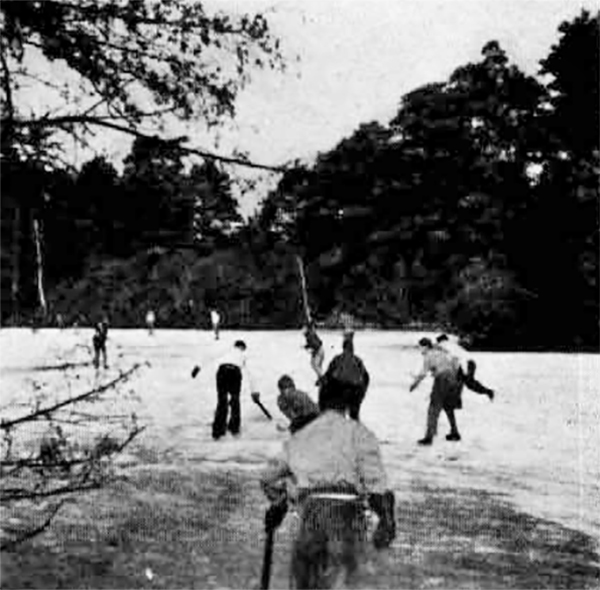
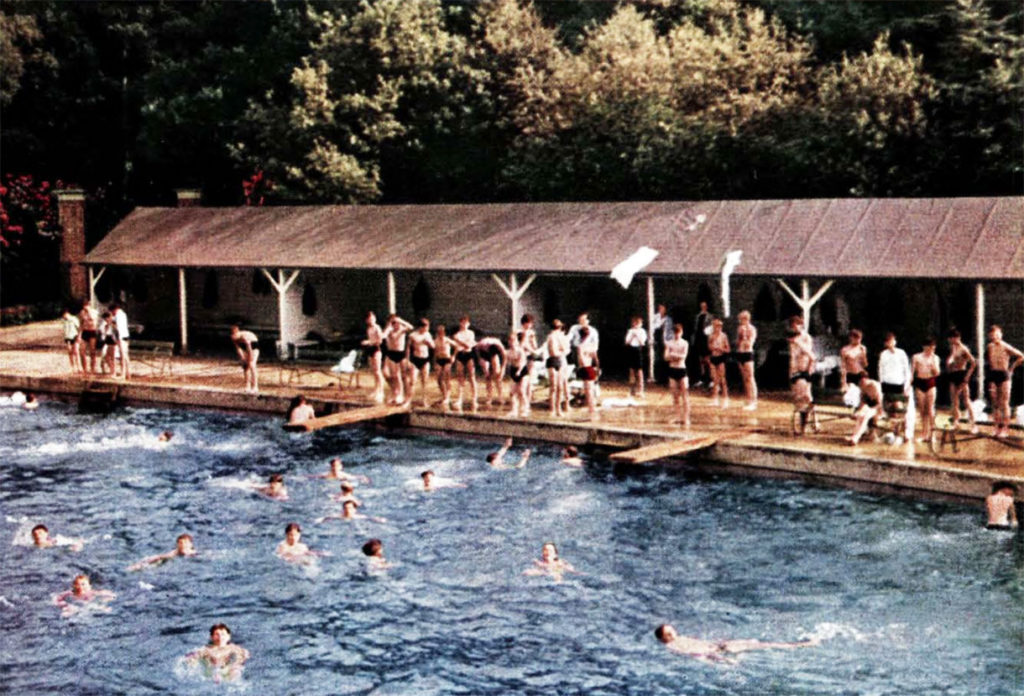
While in the summer, there was swimming:
‘A great asset was the substantially sized [outdoor] swimming pool. This started pretty cold but gradually warmed up as the season progressed. We could not avoid being invigorated by the initial plunge into sub-zero water. However, in the warmth of the summer months it came into its own with inter-House competitions. My average swimming skill was enhanced by a skill I found I unknowingly had for picking up plates which, for some reason, I was able to come up with the complete set without bursting my lungs.’ Colin Mattingley (Talbot 1952-56)
‘Other pastimes included a love of swimming, but the English climate sorely tested this. I remember getting so hypothermic that it would take me several hours to stop shivering.’
Graeme Shelford (Hardinge 1954-57)
Journalism
Some took advantage of the plethora of dormitory magazines to develop skills of writing, drawing or editing:
‘I contributed to a dormitory magazine. Not one of your typed and photocopied productions – the typewriter had not yet reached our age group – and all contributions were in manuscript in one copy of a large notebook produced each term which was passed from hand to hand. Simple stuff, but the pride of authorship built self-esteem.’ Pat Stacpoole (Combermere 1944-48)
‘Once every two to three years or so, the Combermere produced a magazine called the Lion (the Combermere’s heraldic beast) to which all members of the Dormitory could contribute a piece of verse or prose. A regular feature was portraits of the Prefects of the time, in light verse – I contributed more than one lot of these, and in my penultimate year edited the whole magazine. I wonder if any of these have survived – there was only ever one (bound) copy of each edition, which was kept on a sort of communal bookshelf.
In my last term, I was co-opted as an additional Assistant Editor of the Wellingtonian, with the responsibility for arranging for outside bodies to advertise in it – something that I think I had never done before. I see from my ancient copy that we ended up with adverts from Dartmouth, Barclays Bank and Gieves!’ Anonymous
‘Unfortunately, art classes were extra, and my mother could not afford it, so I developed my own home-made skills as a cartoonist by myself. I drew many of the cartoon headings for the various sections of the Wellingtonian under the name TEC.’ Thomas Courtenay-Clack (Hardinge 1954-59)
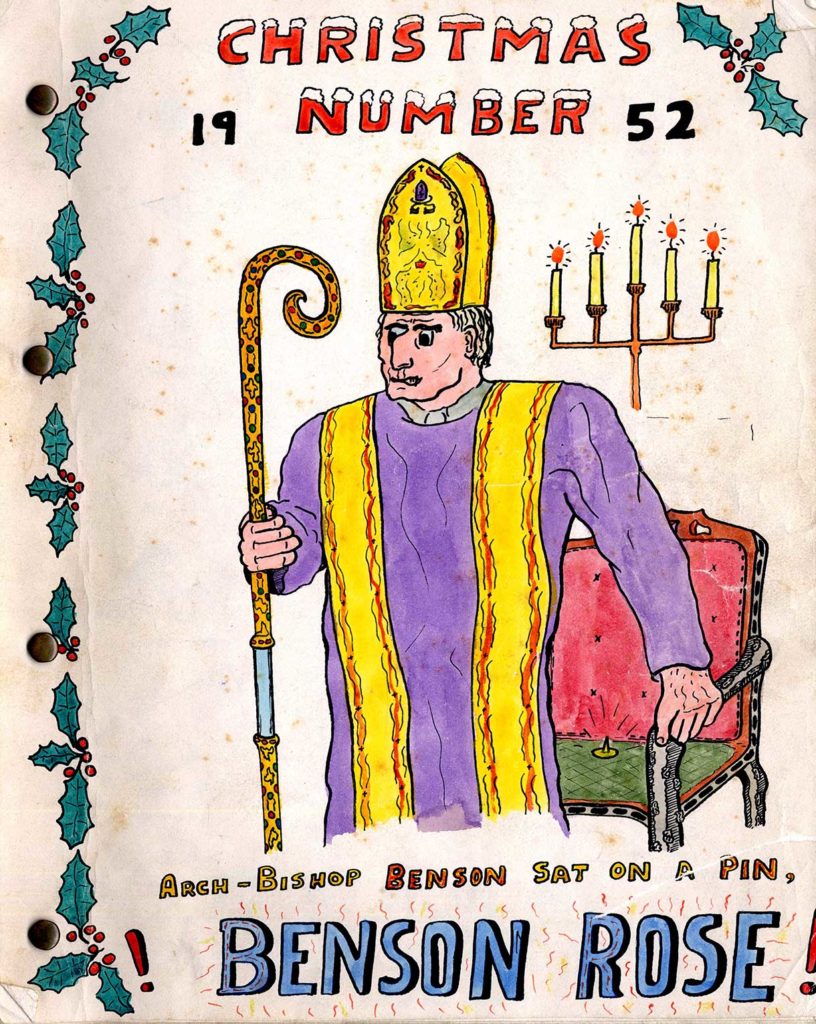

Sometimes films or lectures by visiting speakers would be provided by the College.
A couple of these seem to have lodged in the memory of OWs, for broadly similar reasons:
‘When we went to the cinema or the theatre, it was in the old theatre on the other side of Rockies, which even longer ago had been the original College swimming bath. Many evenings were spent there, and on one occasion Maurice Allen, who presided, announced before a film called The Moulin Rouge was shown, “I have to warn you that some of the young ladies shown in this film are not at all like your sisters!” – I think that film, which we much enjoyed, had somehow slipped past the College censorship system!’ Anthony Bruce (Benson 1951-56)
‘In those days there was an annual lecture by some visiting literary celebrity. One year, around 1949, the lecturer was Harold Nicolson. He was not a success. He seemed totally uninterested in his subject, mumbled through the whole script, and bored us all almost to tears. Our half-holiday had been ruined. It was with some dread that the next year we were told the visiting celebrity was to be a poet. What good was poetry to us when we could be practising in the nets, relaxing at Grubbies, or skiving off to the East Berks Golf Club? The poet was John Betjeman, and he knew exactly how to please a room full of sex- starved teenagers. Starting with Pot Pourri from a Surrey Garden extolling Pam “you great big mountainous sports girl…. the size of her thighs, the pout of her lips,” running through half an hour of his poetry full of sexual innuendo and ending with Joan Hunter-Dunn “furnished and burnished by Aldershot sun,” he held us entranced and amused. Rather to his astonishment, at the close we gave him a standing ovation.’ Richard Wellesley (Benson 1948-53)
Illicit pastimes
Sport, lectures, and the many clubs and societies (discussed on a separate page) were all very well, but many Wellingtonians preferred to spend their free time in a manner which was not sanctioned by the College authorities:
‘Though “illegal,” I used to visit shops in the area with my friend Peter Banks, when I should have been watching school matches.’ George Nicholson (Hardinge 1949-54)
‘My friends and I discovered a dump with all kinds of interesting things. We built some bikes out of junk, using rope for tyres, and not finding anything for brakes, we placed an old cardboard suitcase at the bottom of the hill on our “racetrack,” and stopped by crashing into it.’ Graeme Shelford (Hardinge 1954-57)
The lure of tobacco was mentioned by many:
‘I started metal and woodwork – subjects which were more-or-less optional and provided the circumstances and environment for a quiet smoke with fellow “artisans.” Sweet Caporals – a Canadian Virginian blend – were now becoming short, but Sunday bicycle rides to Sandhurst village could usually produce a packet or so of disgusting faux-Egyptian fags called “Pashas”. Originally, I had been a pipe smoker, but the long walk to the safety of the Ridges with the equipment tucked into my socks was time-consuming, and I feared that my clothes and breath might give off an easily detectable odour.’ Robert Waight (Orange 1942-46)
‘We had a group of five or six that would hang out. The worst thing we did was smoke a few cigarettes in the old air raid shelter in the woods.’
John Armstrong-MacDonnell (Talbot 1952-56)
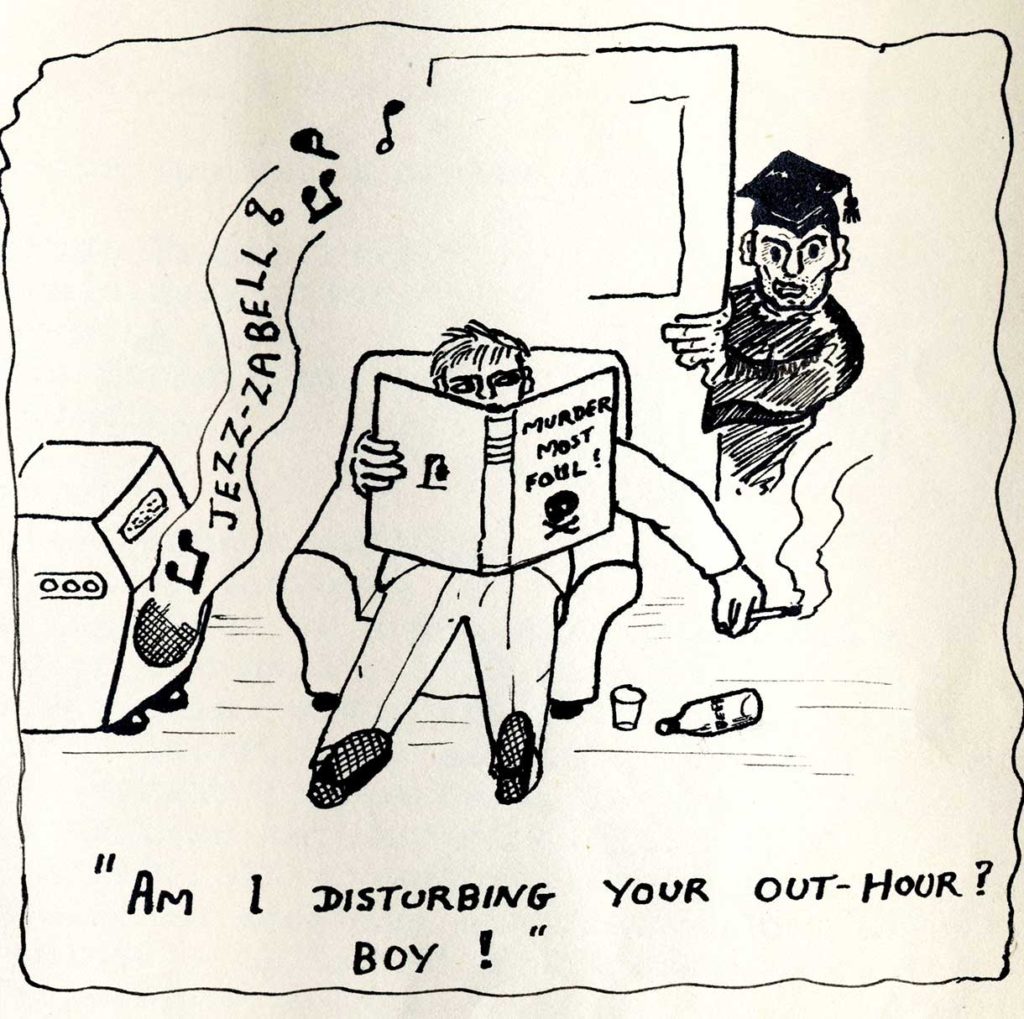
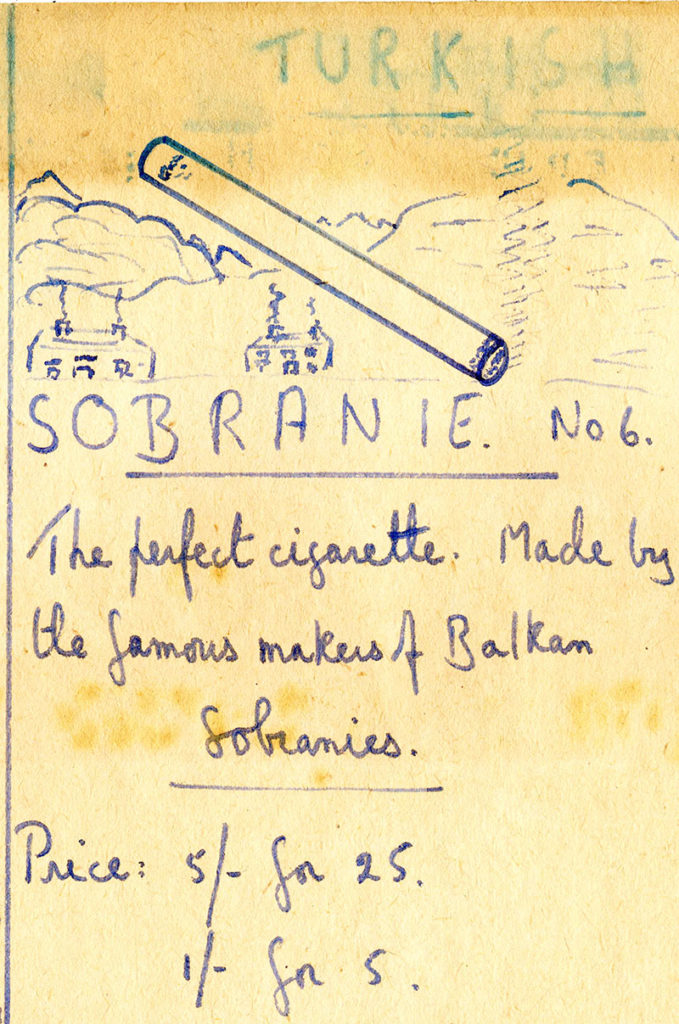
Slipping away into the woods for a puff of terrible cheap cigarettes and an occasional swig of beer from bottles liberated from homes at weekends.’ Andrew Dewar-Durie (Talbot 1953-56)
‘Walking round the lakes occasionally to have an illicit cigarette, usually bent and scaled out of one’s pocket where it had been concealed, Players Bachelor or Gold Flake.’ Martin Kinna (Murray 1953-58)
While some sought other pleasures:
‘Amusements could include a walk with friends to Broadmoor in the rather ghoulish hope of seeing or hearing something of interest, or in the summer up to Heath Pond in the hope of seeing members of the nearby Hermitage Club nudist colony – in both cases without success.’ William Field (Lynedoch 1952-56)
‘A small group of us used to meet up on Sundays with a couple of local girls on the heath or among the rhododendrons – all very chaste by modern standards, but we would probably have been in serious trouble if caught!’ Charles Ward (Hopetoun 1951-55)
‘I remember sneaking off to the air raid shelter adjacent to the Talbot for a Gauloise or a Park Drive cigarette and a review of Tit Bits or Health and Efficiency – the best we could muster in the way of pornography!!’
Stuart Dowding (Talbot 1957-61)
‘Walking with a friend in the pouring rain to Caesar’s Camp, and an illegal pint in a tiny pub in Sandhurst village.’ Michael Peck (Anglesey 1954-59)
‘When I got to the Sixth Form, I had the option of continuing in the Corps or choosing another Wednesday afternoon activity. I agreed with one or two of my friends that East Berks Golf Club was a good alternative, so I took up golf. This had the added bonus of being able to slip down a quick rum and coke before heading back to College.’ Adrian Stephenson (Talbot 1957-61)
Pranks
A few respondents recalled more elaborate escapades, either within the College grounds or further afield:
‘I was in a group of five who liked to leave the dorm and go wandering about the grounds at night, and even further afield to the commons beyond. I loved the wonderful grounds of the College, even at night! We used to leave by a window in the bathroom that gave onto a flat roof, and then climb down a drainpipe where one ended up in an area outside the Dining Hall, and all the world was open before us. This was of course in the middle of the War, and as soon as one left one was straight into the Services, so we decided that it was like a “night patrol” and this would be our excuse! In this group was a boy who had come back from Canada and had brought back a pass key, which was easy enough to buy over there but little known in the UK. This key could open a surprising number of simple mortice locks. Our little patrol found itself in the dark passage under the Dining Hall and we tried all the doors leading off the passage and one revealed the College wine cellar – row upon row of vintage port maturing away. One of the group had a penknife with a bottle opener so we took a bottle out with us and went and drank it in the thick rhododendrons that lined the drive up to the front entrance of College. Several nights later we made another sortie with lemonade bottles, one empty and four filled with water. We decanted port into the empty bottle and water into the empty port bottle, replacing the cork, etc.
I feel I can confess this now as all the others are sadly now dead. On subsequent wanderings, we discovered the lock had been changed but it all served as quite a test of nerves!’’ David Trafford-Roberts (Anglesey 1943-45)
‘Boys used to carry out raids on Crowthorne to emulate their fathers’ wartime exploits. Those caught were usually expelled for a year, but no worse. One group of boys leaving Wellington for the last time wheeled out the cricket sight screens and put them across the main road. There was a lot of fuss, but no culprits identified. Another occasion saw the dismantlement of an usher’s small car and its re-assembly on the College’s roof.’ Peter Davison (Beresford 1948-52)
‘The rules included no riding public transportation and no going to cinemas or theatres. However, my sister wrote that she was attending the Old Vic in London with some friends, and could I join them? Thinking it was a great opportunity to escape and meet some girls, I rode my bike to Camberley station and caught the train into London. I arrived late at the Old Vic and had to sit out the first act in the corridor. I barely met my sister’s friends at intermission and had to leave for the station immediately after the play. Unfortunately, I caught the wrong train and spent a couple of hours trying to make it back. I had to go directly to Crowthorne station, arriving a few minutes before curfew. I ran for my life back to College, arriving at the Hardinge door out of breath and sweaty, right on curfew time. Marston was at the door, looking at his watch, and commented, “Cutting it a bit fine, aren’t you, Shelford?” He had no idea how fine I had cut it. I had to break the rules again the next day by taking a bus to Camberley station to retrieve my bike. Reviewing my escapade afterwards, I realized that I had taken a huge risk to see half a play, get lost and very nearly get caught. I decided it hadn’t been worth it and didn’t try anything like that again.’ Graeme Shelford (Hardinge 1954-57)
